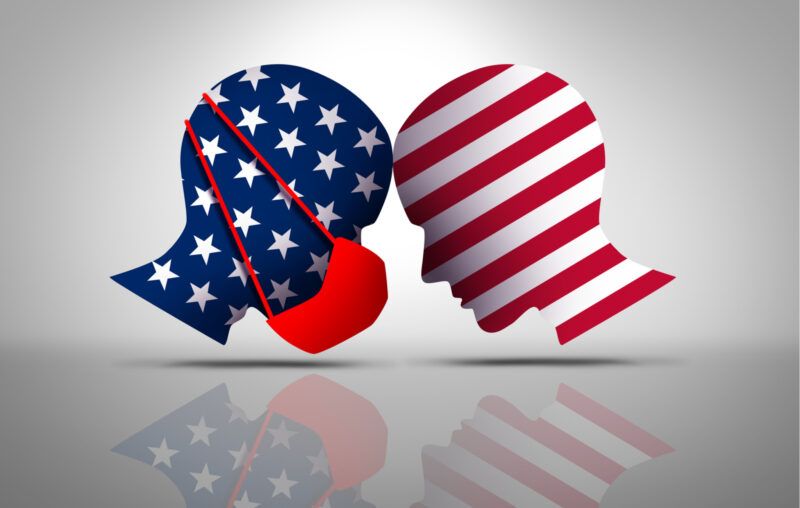US v. Lopez Voids the National Mask Mandate

Democratic Presidential hopeful Joe Biden has promised if elected to implement a national mask mandate.
Due to stare decisis, the general obligation of courts to follow established precedent in similar cases, SCOTUS should strike down such a mandate. (I think it should strike down state and local mask mandates and lockdowns, too, but that requires a different argument.)
One key settled point of law is that the federal government (via laws or executive orders) has police (i.e. regulatory) powers only in instances of interstate commerce. That gives it broad but not infinite scope.
The defining case, United States v. Lopez (1995) 514 U.S. 549, pitted a gun-toting high schooler against the Gun-Free School Zones Act of 1990, which made it a federal offense to possess a firearm in a school zone. The student won because SCOTUS upheld the view of the Fifth Circuit Court of Appeals that the act constituted an unconstitutional usurpation of power because mere possession of a firearm does not significantly affect interstate commerce.
Chief Justice William Rehnquist, for the majority, started with first principles: “The Constitution creates a Federal Government of enumerated powers” in order to “ensure protection of our fundamental liberties.” “Just as the separation and independence of the coordinate branches of the Federal Government serve to prevent the accumulation of excessive power in any one branch,” he wrote, quoting earlier authority, “a healthy balance of power between the States and the Federal Government will reduce the risk of tyranny and abuse from either front.”
Rehnquist then moved on to the seminal decision in Gibbons v. Ogden (1824, 9 Wheaton 1), in which Chief Justice Marshall explicitly stated that the Commerce Clause does NOT extend to “commerce, which is completely internal, which is carried on between man and man in a State, or between different parts of the same State, and which does not extend to or affect other States.” After all, Marshall reasoned, “such a power would be inconvenient, and is certainly unnecessary” because states or municipalities could pass any such Constitutional regulations their elected officials felt their constituents needed.
Rehnquist next explained how SCOTUS, in a number of decisions stretching decades, distinguished cases in gray areas. Congress could regulate activities that directly affected interstate commerce but not those that indirectly affected it. The justification for this formal distinction was the fear, Rehnquist explained, that “there would be virtually no limit to the federal power and for all practical purposes we should have a completely centralized government.”
Cowed by FDR’s threat to pack the court with additional justices, SCOTUS loosened its criteria in 1937 to uphold the New Deal’s Fair Labor Standards Act. In 1942, in Wickard v. Filburn, it upheld the Agricultural Adjustment Act by allowing the federal government to regulate wheat grown for personal consumption. Even at their most lax, however, SCOTUS justices asserted that the Commerce Clause had to have limits lest federalism die, exposing all Americans to tyranny on a national scale.
Beginning in the 1960s, the High Court started to establish a rational basis for the extent of the national government’s powers under the Commerce Clause. Rehnquist himself was part of that movement, noting that “simply because Congress may conclude that a particular activity substantially affects interstate commerce does not necessarily make it so.” He interpreted Wickard to mean not that the police power of the federal government was absolute but that it could regulate de minimis individual behavior, like growing wheat for personal consumption, that collectively would have a substantial effect on interstate commerce.
Wickard was a textbook case of economics: if enough individuals grew wheat for personal consumption, it would have impacted the federal government’s policy goals, as economically daft as they were. It might seem possible to make the same argument for masks but scientists have not yet made a compelling case that mandatory masking stops the spread of the coronavirus much less that it has an effect on the economy. Indeed, one recent study is now under retraction watch because its key finding hinged on a typographical error. Moreover, most policymakers and opinion makers have not considered the costs of masking and shout down, censor, or ignore those who bring them up.
Where Wickard had an economic rationale, masking merely masks the underlying reality of our situation. Clearly, employed Americans are avoiding certain socioeconomic activities for two reasons; because they do not want to catch Covid or because they do not want to mask. Rather than a federal mask ban or mandate, which will kill demand from one segment of the population or the other, businesses ought to be allowed to develop their own policies. That might mean mandating masks at your waterpark (hey, I am in Georgia and it is like 80°F and humid as heck), ski lodge, etc. one weekend and banning them the next and letting customers sort themselves. Gyms, theaters, and stores could open daily with mandatory masking but then switch to no masks or voluntary masking at some point according to local demand conditions. In that scenario, everybody buys when and how they want and interstate commerce is maximized ceteris paribus. That approach also avoids running roughshod over the rights of a growing minority of heroes, Covid-19 survivors.
Other avenues to a federal mask mandate are also blocked. According to the decision in Lopez, the federal government’s police powers extend to only three areas:
- keeping the channels of interstate commerce free from immorality, e.g., laws against sex trafficking.
- maintaining the instrumentalities of interstate trade, e.g., trucks, even if only used intrastate.
- regulating economic activities that have a “substantial relation” to interstate commerce.
Lopez drew a line in the sand between merely affecting in some way and having a substantial effect.
I dare anyone to argue that masks are instrumentalities of interstate trade (#2).
I double dare anyone to argue that not wearing a mask is tantamount to sex trafficking (#1).
But does masking bear a substantial relation to interstate commerce? Masks are articles of interstate commerce and hence could be federally regulated like other articles of commerce. But a mask mandate is not about the article, just like Lopez wasn’t about where guns were manufactured or sold; it was about an individual’s right to bear arms. Yes, a creative person can weave stories about how school crime might affect interstate trade, just like creative lockdowners will come up with convoluted stories about masking and commerce, but there is no clear “nexus” between gun possession or wearing a mask and interstate commerce.
Moreover, the federal government’s gun law overrode the rights of local policymakers who were competent to regulate school gun zones for themselves, just as with masks (if that is constitutional, which, again, I doubt but will not tackle here). There was a reason that the Founders did not endow the federal government with police powers. It was a bad idea, and they knew it, as did almost all Americans at the time.
Some, nay most, matters are best decided locally. How is a South Dakota eighth grader, for example, supposed to road hunt pheasants on the way home from school if she can’t keep her shotgun in the truck? Most readers will have no idea what I am talking about and that is the point. People can legally drive at age 14 in South Dakota and shoot pheasants, which are a ubiquitous, tasty introduced species, right on most roads, where they congregate in late afternoons to eat grit for their gizzards. Gasoline is expensive, daylight short, and home maybe 20 or 30 miles off, so it would be “environmentally” insensitive not to shoot some birds during the trip.
That same young lady doesn’t need Joe Biden telling her that she has to wear a mask when using a filling station that might have a dozen customers — total, for the day. In fact, she probably believes that she has a Constitutional right to contract Covid-19 and in the highly unlikely event it kills her or a loved one, it was God’s will. And she certainly doesn’t want to tell an atheist who takes the subway to and from school what to believe, or do. The brilliance of our system is that she doesn’t have to. Each state, or better yet municipality, can make intimate decisions for themselves, based on local conditions and preferences. We used to consider such distributed decision-making a key component of democracy.
None of this means that Biden won’t still try to implement a national mask mandate. In fact, he faces a potential “win-win” situation if most Americans support such a mandate. Maybe Chief Justice Roberts finds a way to finesse a judgement favorable to Biden and carries the court with him, rendering Biden a hero (anti-hero). But even if Roberts turns, we could still see a 5-4 majority for striking down the mandate, in which case Biden could use the decision as an excuse to add justices, his picks, to the court.
Had the Founders enjoyed perfect foresight, they would have either fixed the number of justices constitutionally or mandated that any additional justices be chosen in a less partisan way, perhaps even during the next presidential administration.
Alas, the Founders, like the rest of us, were flawed, their rationality bounded by the assumptions of their times, when gentlemen and statesmen would never stoop so low as Biden appears ready to do in his brazen attempt to follow “the” scientists but not “the other” scientists.










